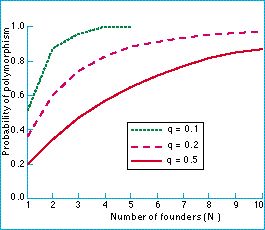Random events in population genetics - What are the effects of random sampling?

The founder effect can have two interesting consequences:
1. If a small sample of individuals is taken from a larger population, there is a chance that an allele will be lost. In the case of two alleles, A and a , if the founding population are all aa homozygous then the A allele will be lost and the new population will be genetically monomorphic. In fact, as the graph shows, the founding effect is quite ineffective at reducing genetic variation - even if the founding population is very small, even less than 10, it will usually possess both alleles.
2. In a small sample, the frequencies of the genes may differ from the parental population. Isolated populations often have exceptionally high frequencies of otherwise rare alleles, and the most likely explanation is that the founding population had a disproportionate number of those rare alleles. The frequency of Huntington’s disease in South Africa is a good example of this.
Figure: the chance that a founder population will be homozygous depends on the number of founders and the gene frequencies. The probability of polymorphism is shown for three different gene frequencies (q) at a two-allele locus.
| Next |



